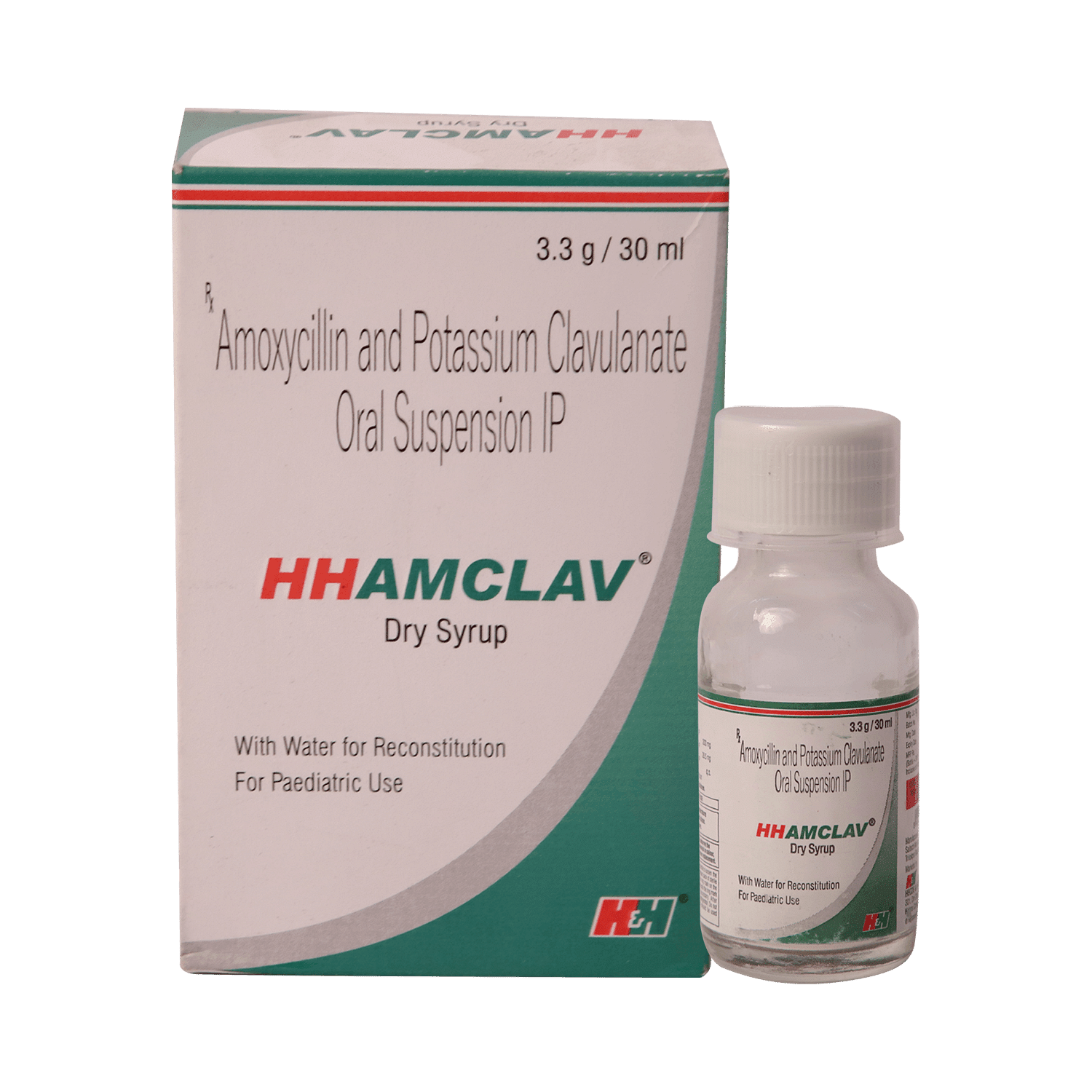
Dmox CV Dry Syrup
Manufacturer
Disan Pharma
Salt Composition
Amoxycillin (200mg/5ml) + Clavulanic Acid (28.5mg/5ml)
Key Information
Short Description
Dmox CV Dry Syrup is an antibiotic medicine that helps treat bacterial infections of the ear, nose, throat, chest, lungs, teeth, skin, and urinary tract.
Dosage Form
Dry Syrup
Introduction
Dmox CV Dry Syrup is an antibiotic medicine that helps treat bacterial infections of the ear, nose, throat, chest, lungs, teeth, skin, and urinary tract. It is capable of killing bacteria that have become resistant to other therapies and thus also helps treat tuberculosis that is resistant to other treatments.
Directions for Use
Never give Dmox CV Dry Syrup until and unless prescribed by the doctor. You must also never share your child’s medicine with anyone else even if they show similar symptoms.
Safety Information
Side Effects
No common side effects listed.
How it works
Dmox CV Dry Syrup is an antibiotic. It has two active agents amoxycillin and clavulanic acid. Amoxycillin works by preventing the formation of the bacterial protective covering (cell wall) essential for the survival of the bacteria. Whereas clavulanic acid serves a special purpose of inhibiting an enzyme (beta-lactamase) that is produced by resistant bacteria. This makes the combination of amoxycillin and clavulanic acid an effective line of treatment for many types of infections.
Quick Tips
Never give Dmox CV Dry Syrup to treat common cold and flu-like symptoms caused by viruses. Never save medicine for future illnesses. It cannot be said whether the same medicine will work on future infections. Check ‘expiry’ before giving Dmox CV Dry Syrup to your child. Immediately discard all the expired medicines. Stop Dmox CV Dry Syrup immediately if your child develops an itchy rash facial swelling or breathing difficulty. Report to the doctor without any delay.
Related Medicines

Advent 228.5mg Dry Syrup Tangy Orange

Moxiphage CV Dry Syrup

Hhamclav Dry Syrup

Amoit CV Dry Syrup

Altramox CV Dry Syrup

Wixiclav Dry Syrup

Tagmox Dry Syrup

Voxlin Dry Syrup

Amoxul Dry Syrup

Espimox CV Dry Syrup
Frequently asked questions
Can other medicines be given at the same time as Dmox CV Dry Syrup?
It's important to inform your child's doctor about any other medications they are taking before starting Dmox CV Dry Syrup. They can advise on potential interactions and ensure safe medication use.
Can I get my child vaccinated while on treatment with Dmox CV Dry Syrup?
In most cases, antibiotics do not interfere with the ingredients in vaccines or cause a negative reaction. However, children should only receive vaccinations once they are recovered from an illness, unless advised by their doctor.
Which lab tests may my child undergo while taking Dmox CV Dry Syrup on a long-term basis?
Periodically, the doctor may conduct kidney and liver function tests during prolonged treatment with Dmox CV Dry Syrup to monitor your child's condition.
Can I give a higher than the recommended dose of Dmox CV Dry Syrup to my child?
Giving a higher dose of Dmox CV Dry Syrup can increase risks of side effects. If your child experiences worsened symptoms, consult their doctor for re-evaluation.
Can I stop giving Dmox CV Dry Syrup to my child when the symptoms are relieved?
Do not stop giving Dmox CV Dry Syrup until the full course of treatment is completed, even if your child feels better. Symptoms may improve before the infection is completely cured.
Can the use of Dmox CV Dry Syrup cause diarrhea?
Dmox CV Dry Syrup can cause diarrhea as it's an antibiotic that kills harmful bacteria, and can also affect the beneficial bacteria in your child’s stomach. Encourage your child to drink plenty of fluids if they experience diarrhea. If diarrhea persists or you notice signs of dehydration like less frequent urination with dark urine, consult your doctor before giving any other medication.
Do all viral common colds result in secondary bacterial infection?
Most viral colds do not lead to secondary bacterial infections. In most cases, using antibiotics in a viral cold can increase the risk of side effects and should only be done after consulting your doctor.
The mucus coming out of my child’s nose is yellow-green. Is it a sign of a bacterial infection?
Yellow or green mucus in the nose doesn't necessarily mean a bacterial infection. It is normal for nasal mucus to thicken and change color during a common cold.
Is there any sign which shows that my child needs immediate medical attention?
Call your child’s doctor immediately if you notice serious allergic reactions (breathing difficulties, skin rashes), gastrointestinal problems (diarrhea), or liver damage (weakness, pallor, vomiting).


